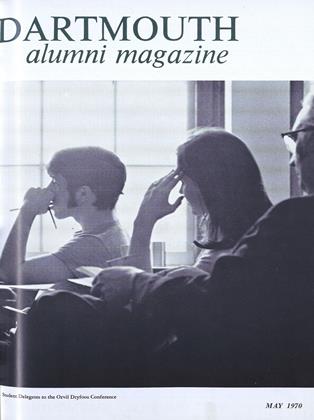By AlbertWilliam Levi '32. Bloomington & London:Indiana University Press, 1970. 96 pp.$4.95.
The five lectures making up this book treat the Humanities under the headings: Definition, Values, Humanistic Knowledge, Culture, Ultimate Aims. The author's learning and the breadth of his frame of reference are not necessarily an advantage, since they diffuse the book's focus and leave it torn between the impulse to give a comprehensive view of the Humanities throughout history and the impulse to show the Humanities today.
Professor Levi's definition that the Humanities are synonymous with the liberal arts conceived as the arts of communication, the arts of continuity, and the arts of criticism fits well into the broad, somewhat abstract Aristotelian framework he likes to deal with, but lacks some operative edge, some dynamic thrust capable of propelling the Humanities into the lived context of our common experience. There is some existential failure, both here and in the chapter dealing with values, where one is never given an adequate notion of what values might be and how the Humanities might convey them. The Humanities are not, finally, a body of "disciplines" but rather a form of human consciousness, that form of consciousness most concerned with ultimate questions, as opposed to the descriptive sciences. Although Professor Levi repeats William Arrowsmith's critique of Humanities teachers as being timid and lacking vigor, he does not seem to realize that he himself is open to just such a charge.
The best chapter is that which deals with culture, a chapter which displays imagination, energy, and the ability to quote well. Here the weaving together of themes from literature, philosophy, and history is extremely successful.
Professor Levi's book is a useful compendium of what people (including some American Congressmen and jurists) have thought about the Humanities. It organizes the different ways of talking about the Humanities and makes a preliminary synthesis which impresses me as the first stage of a potentially valuable study that has yet to be written.
Mr. Oxenhandler is Professor of RomanceLanguages and Comparative Literature atthe College.
 View Full Issue
View Full Issue
More From This Issue
-
 Feature
FeatureA CHANCE FOR THE PENTAGON TO HELP SOLVE SOME DOMESTIC AS WELL AS MILITARY PROBLEMS
May 1970 By GERALD G. GARBACZ '58 -
 Feature
FeatureThe Great Love Affair Between Students and Films
May 1970 By MAURICE H. RAPF '35 -
 Feature
FeatureProject IMPRESS
May 1970 By JOANNA STERNICK -
 Feature
FeatureStudent Views Feature Dryfoos Conference
May 1970 -
 Article
ArticleThe Undergraduate Chair
May 1970 By WINTHROP A. ROCKWELL '70 -
 Article
ArticleThe Faculty
May 1970 By WILLIAM R. MEYER
Books
-
 Books
BooksThe April issue of the Current History
June 1931 -
 Books
BooksBig Apple Circus
JUNE 1983 By Frank Small Wood '51 -
 Books
BooksThe Book That Changed My Life
JULY | AUGUST 2018 By GEORGE M. SPENCER -
 Books
BooksWINSLOW HOMER.
JANUARY 1973 By HELEN MORSE -
 Books
BooksJoseph Hawley, Colonial Radical
DECEMBER 1931 By Robert E. Riegel -
 Books
Books"SPEAK THAT I MAY SEE THEE!": THE RELIGIOUS SIGNIFICANCE OF LANGUAGE.
OCTOBER 1968 By T.S.K. SCOTT-CRAIG

